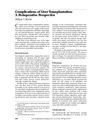 September 2023 in “Fides et Ratio”
September 2023 in “Fides et Ratio” The safety and effectiveness of gender-affirming treatments for children are uncertain, with potential long-term risks like infertility.
 September 2018 in “Fertility and Sterility”
September 2018 in “Fertility and Sterility” African American women have a higher risk of preterm delivery than Caucasian women, and inflammatory stimuli affect gene expression in cells related to PCOS, showing a heightened inflammatory state in women with PCOS.
 11 citations,
September 1999 in “Journal of the European Academy of Dermatology and Venereology”
11 citations,
September 1999 in “Journal of the European Academy of Dermatology and Venereology” Immunomodulatory therapies are effective for treating cutaneous lymphoma, particularly in early stages.
 2 citations,
July 1999 in “Liver transplantation and surgery”
2 citations,
July 1999 in “Liver transplantation and surgery” Liver transplant can lead to neurological, pulmonary, cardiovascular, and renal complications, with older patients facing higher risks.
 42 citations,
January 2021 in “Journal of Clinical Medicine”
42 citations,
January 2021 in “Journal of Clinical Medicine” Microneedle arrays with nanotechnology show promise for painless drug delivery through the skin but need more research on safety and effectiveness.
 3 citations,
May 2018 in “Experimental Dermatology”
3 citations,
May 2018 in “Experimental Dermatology” Young HS patients often have other physical and mental health issues, and research on HS covers a wide range of topics including genetics, triggers, treatments, and the need for more data.
15 citations,
January 2022 in “Immune Network/Immune network” New targeted immunotherapies are improving treatment for inflammatory skin diseases.
37 citations,
December 2021 in “Cells” Alopecia areata severity and treatment response are linked to specific cytokine levels.
9 citations,
November 2016 in “Archives of Plastic Surgery” The L-U mixture promotes hair growth as effectively as minoxidil.
 71 citations,
April 2020 in “Journal of Cosmetic Dermatology”
71 citations,
April 2020 in “Journal of Cosmetic Dermatology” Genetic differences may affect COVID-19 deaths; anti-androgens could be potential treatment.
 4 citations,
January 2012 in “Elsevier eBooks”
4 citations,
January 2012 in “Elsevier eBooks” The document concludes that various skin conditions have specific treatments, ranging from antihistamines for urticaria to surgery and medication for tumors and chronic skin diseases.
 3 citations,
August 2022 in “Curēus”
3 citations,
August 2022 in “Curēus” The SARS-CoV-2 vaccine may be linked to triggering autoimmune conditions like Alopecia Areata.
 21 citations,
April 2010 in “Molecular Medicine Reports”
21 citations,
April 2010 in “Molecular Medicine Reports” Zinc supplementation may help improve treatment outcomes for chronic hepatitis C.
 April 2021 in “Journal of Investigative Dermatology”
April 2021 in “Journal of Investigative Dermatology” People with atopic dermatitis have more CD4+ T cells that respond to a certain bacterial lipid, which may play a role in the skin condition's inflammation.
 December 1920 in “The Lancet”
December 1920 in “The Lancet” The document discusses various public health initiatives and societal issues, emphasizing early intervention and support.
 46 citations,
September 2014 in “Steroids”
46 citations,
September 2014 in “Steroids” Plant steroid hormones show growth, health, and medicinal benefits in various organisms, including potential for treating diseases.
 January 2024 in “International journal of pharmaceutical sciences review and research”
January 2024 in “International journal of pharmaceutical sciences review and research” Indian jujube has many medicinal properties and can help treat ailments like diabetes, inflammation, and cancer.
 139 citations,
February 2010 in “The journal of allergy and clinical immunology/Journal of allergy and clinical immunology/The journal of allergy and clinical immunology”
139 citations,
February 2010 in “The journal of allergy and clinical immunology/Journal of allergy and clinical immunology/The journal of allergy and clinical immunology” Transplant success has improved with better immunosuppressive drugs and donor matching.
 152 citations,
December 2007 in “Gender Medicine”
152 citations,
December 2007 in “Gender Medicine” Male and female skin differ due to hormones, affecting conditions like hair loss, acne, and skin cancer, and suggesting a need for gender-specific treatments.
22 citations,
August 2021 in “Frontiers in medicine” Immune cells in Hidradenitis suppurativa become more inflammatory and may be important for treatment targets.
 November 2013 in “John Wiley & Sons, Ltd eBooks”
November 2013 in “John Wiley & Sons, Ltd eBooks” Skin symptoms can indicate endocrine disorders and have various treatments.
9 citations,
August 2021 in “International journal of molecular sciences” PPARγ is essential for maintaining healthy skin, controlling inflammation, and ensuring proper skin barrier function.
 369 citations,
June 2013 in “Biochimie”
369 citations,
June 2013 in “Biochimie” Myo-inositol supplements may improve insulin sensitivity and help with conditions like PCOS and gestational diabetes, but more research is needed.
 12 citations,
November 2021 in “Journal of Clinical Medicine”
12 citations,
November 2021 in “Journal of Clinical Medicine” Kidney transplant patients who had COVID-19 experienced a significant drop in their quality of life due to long-lasting symptoms.
 25 citations,
November 2001 in “Kidney International”
25 citations,
November 2001 in “Kidney International” Male hormones worsen kidney transplant damage, but blocking them helps.
 72 citations,
December 2012 in “Expert Opinion on Drug Delivery”
72 citations,
December 2012 in “Expert Opinion on Drug Delivery” Niosomes are promising for skin drug delivery, offering benefits like improved drug penetration and stability.
 September 2016 in “Elsevier eBooks”
September 2016 in “Elsevier eBooks” Different types of hair loss in dogs and cats have various causes and treatments, with outcomes ranging from good to uncertain.
 66 citations,
March 2009 in “British journal of surgery”
66 citations,
March 2009 in “British journal of surgery” Hidradenitis suppurativa treatment should be tailored to the individual, with quitting smoking being important.
 211 citations,
February 2009 in “European journal of pharmaceutics and biopharmaceutics”
211 citations,
February 2009 in “European journal of pharmaceutics and biopharmaceutics” Hair follicles help absorb and store topical compounds, aiding targeted drug delivery.
 114 citations,
January 2021 in “medRxiv (Cold Spring Harbor Laboratory)”
114 citations,
January 2021 in “medRxiv (Cold Spring Harbor Laboratory)” COVID-19 can cause over 50 long-term symptoms, with fatigue and headache being the most common.
























